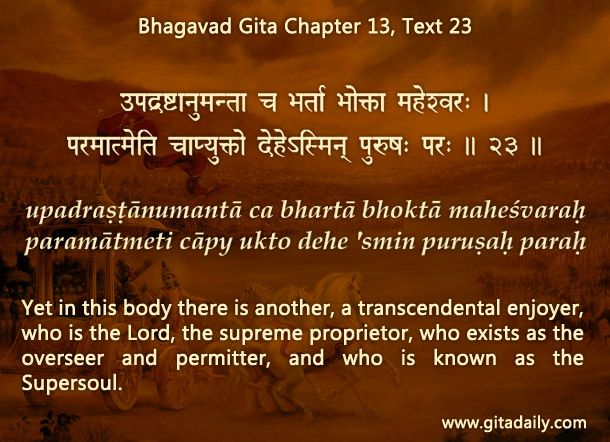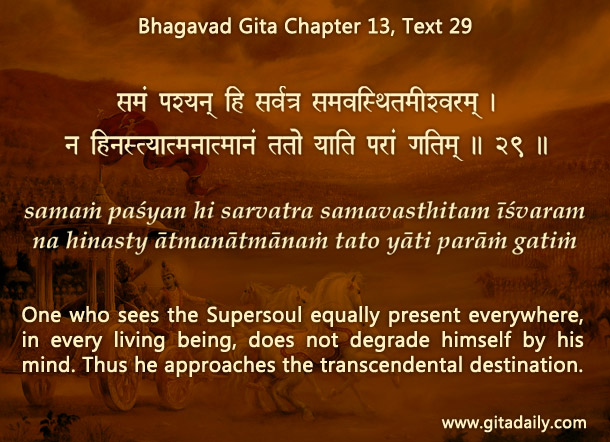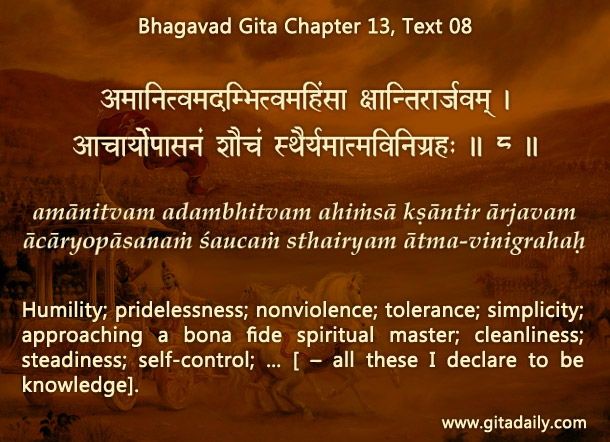seeing through the eyes of scriptures
The Glories of the Thirteenth Chapter of the Bhagavad Gita from the Padma Purana

Lord Shiva said, “Oh Parvati, please hear the unlimited glories of the Thirteenth Chapter of the Srimad Bhagavad-gita, by hearing which, you will become very happy.
In the South, there was a very large river of the name Tungabhadra, on the banks of which; there is a very beautiful town of the name Hariharpur. There, the deity of Lord Shiva, known by name Harihar, is worshipped. One, who has His darshan, attains auspicious things.
In Hariharpur lived one brahmana by the name of Hari-diksit, who was very learned, and lived a simple, austere life. His wife was called Duracara, by the people. The reason for this was due to her low-class activities. She would always speak to her husband in abusive language, and she had never slept with him. She was always rude to her husband’s friends, and she would keep company with other men, to satisfy her lusty desires. She was also addicted to taking various kinds of intoxicants. Seeing that the town was becoming more and more populated, she constructed a small structure in the forest where she could meet her lovers.
One night, feeling very lusty, and not having been able to find any lover to satisfy her lust, she went out into the forest to her meeting place, to see if any of her lovers were there. Not finding anyone at that place, and burning up with lust, she started to wander in the forest in the hope of finding someone to satisfy her lusty desires. After having wandered for some time, and finding that her body, senses and mind were paining so much, due to not being able to satisfy their lust, she became bewildered and sat down and started to cry.
Hearing the sound of her crying, one hungry tiger, who was sleeping, woke up and reached that place very quickly. Hearing the tiger coming, the lusty woman got up and thinking to herself that surely someone is coming who would satisfy her needs, she all of a sudden saw a tiger arrive in in front of her. He was about to rip her apart with his sharp claws.
At that time, the lusty woman addressed the tiger, “Oh tiger, why have you come here to kill me? First you must tell me this and then you can kill me.” That king of animals refrained from killing Durachara, and laughed. Then he related the following story.

“In the South there is a river of the name Malapaha. On the bank of which is the town of Muniparna. At that place, there is a famous deity of Lord Shiva, known as Panchalinga. In that town I had taken birth in a brahmana family. Although I had taken such a high birth, I was still very greedy, and had no control over my senses. I used to sit on the banks of the river and perform sacrifices for those persons, who were not qualified to partake in such performances. I would also eat from the homes of materialistic persons. I would also collect more funds than necessary in the name of performing sacrifices and worship for the deity, and use the same for my own sense gratification. I would also criticize those brahmanas who were strictly following the regulative principles, and I would never give charity to anyone. Slowly I became old, my hah- turned white, my teeth fell out, my eyes became weak, but even still, I did not lose my lust to collect and hoard more funds. One day, by mistake, I went to the house of some brahmanas, who were very cruel and expert at cheating, to beg some food, when they set the dogs on me. One of those dogs bit my leg and I fell over and very quickly died. After that, I attained this tiger’s body, and I am living in this dangerous forest.
Fortunately, I am able to remember my last birth and in this birth I do not attack any devotee, sannyasi or chaste lady. Only those sinful, persons and unchaste woman I take as my food. As you are the most unchaste, and sinful woman, you will definitely become my lunch.”

After the tiger had finished his narration, he devoured that sinful woman. Thereafter, the Yamadutas threw her into the hell known as Duyada, which is a lake full of stool, urine and blood. And she had to stay in that filthy place for ten million kalpas. After that, she was thrown into the hell known as Raurava, where she stayed for one hundred manvataras, after which she again took birth on earth as a female chandala. Again she lived in the same sinful way as she had previously. Due to her sinful activities, she got leprosy and also tuberculosis. By chance and good fortune, she once went to the holy place of Hariharpur and close to the temple of Jambakadevi (Parvati). She saw the great saint Vasudeva who was always reciting the Thirteenth Chapter of Srimad Bhagavad-gita. From his mouth she heard that recitation, and becoming attracted, she heard it again and again and by that hearing, she was able to give up that body of a chandala and becoming completely free from the reactions of her past sinful activities. She attained a four-armed form similar to Lord Vishnu, and she was taken to Vaikuntha.

Views: 908
-
Comment by Paramananda das on May 1, 2019 at 6:02am
-
-
Comment by Paramananda das on May 1, 2019 at 6:16am
-
Bhagavad Gita Chapter 13
Nature, the Enjoyer and Consciousness
TEXTS 1-2: Arjuna said: O my dear Kṛṣṇa, I wish to know about prakṛti [nature], puruṣa [the enjoyer], and the field and the knower of the field, and of knowledge and the object of knowledge. The Supreme Personality of Godhead said: This body, O son of Kuntī, is called the field, and one who knows this body is called the knower of the field.
TEXT 3: O scion of Bharata, you should understand that I am also the knower in all bodies, and to understand this body and its knower is called knowledge. That is My opinion.
TEXT 4: Now please hear My brief description of this field of activity and how it is constituted, what its changes are, whence it is produced, who that knower of the field of activities is, and what his influences are.
TEXT 5: That knowledge of the field of activities and of the knower of activities is described by various sages in various Vedic writings. It is especially presented in Vedānta-sūtra with all reasoning as to cause and effect.
TEXTS 6-7: The five great elements, false ego, intelligence, the unmanifested, the ten senses and the mind, the five sense objects, desire, hatred, happiness, distress, the aggregate, the life symptoms, and convictions – all these are considered, in summary, to be the field of activities and its interactions.
TEXTS 8-12: Humility; pridelessness; nonviolence; tolerance; simplicity; approaching a bona fide spiritual master; cleanliness; steadiness; self-control; renunciation of the objects of sense gratification; absence of false ego; the perception of the evil of birth, death, old age and disease; detachment; freedom from entanglement with children, wife, home and the rest; even-mindedness amid pleasant and unpleasant events; constant and unalloyed devotion to Me; aspiring to live in a solitary place; detachment from the general mass of people; accepting the importance of self-realization; and philosophical search for the Absolute Truth – all these I declare to be knowledge, and besides this whatever there may be is ignorance.
TEXT 13: I shall now explain the knowable, knowing which you will taste the eternal. Brahman, the spirit, beginningless and subordinate to Me, lies beyond the cause and effect of this material world.
TEXT 14: Everywhere are His hands and legs, His eyes, heads and faces, and He has ears everywhere. In this way the Supersoul exists, pervading everything.
TEXT 15: The Supersoul is the original source of all senses, yet He is without senses. He is unattached, although He is the maintainer of all living beings. He transcends the modes of nature, and at the same time He is the master of all the modes of material nature.
TEXT 16: The Supreme Truth exists outside and inside of all living beings, the moving and the nonmoving. Because He is subtle, He is beyond the power of the material senses to see or to know. Although far, far away, He is also near to all.
TEXT 17: Although the Supersoul appears to be divided among all beings, He is never divided. He is situated as one. Although He is the maintainer of every living entity, it is to be understood that He devours and develops all.
TEXT 18: He is the source of light in all luminous objects. He is beyond the darkness of matter and is unmanifested. He is knowledge, He is the object of knowledge, and He is the goal of knowledge. He is situated in everyone’s heart.
TEXT 19: Thus the field of activities [the body], knowledge and the knowable have been summarily described by Me. Only My devotees can understand this thoroughly and thus attain to My nature.
TEXT 20: Material nature and the living entities should be understood to be beginningless. Their transformations and the modes of matter are products of material nature.
TEXT 21: Nature is said to be the cause of all material causes and effects, whereas the living entity is the cause of the various sufferings and enjoyments in this world.
TEXT 22: The living entity in material nature thus follows the ways of life, enjoying the three modes of nature. This is due to his association with that material nature. Thus he meets with good and evil among various species.
TEXT 23: Yet in this body there is another, a transcendental enjoyer, who is the Lord, the supreme proprietor, who exists as the overseer and permitter, and who is known as the Supersoul.
TEXT 24: One who understands this philosophy concerning material nature, the living entity and the interaction of the modes of nature is sure to attain liberation. He will not take birth here again, regardless of his present position.
TEXT 25: Some perceive the Supersoul within themselves through meditation, others through the cultivation of knowledge, and still others through working without fruitive desires.
TEXT 26: Again there are those who, although not conversant in spiritual knowledge, begin to worship the Supreme Person upon hearing about Him from others. Because of their tendency to hear from authorities, they also transcend the path of birth and death.
TEXT 27: O chief of the Bhāratas, know that whatever you see in existence, both the moving and the nonmoving, is only a combination of the field of activities and the knower of the field.
TEXT 28: One who sees the Supersoul accompanying the individual soul in all bodies, and who understands that neither the soul nor the Supersoul within the destructible body is ever destroyed, actually sees.
TEXT 29: One who sees the Supersoul equally present everywhere, in every living being, does not degrade himself by his mind. Thus he approaches the transcendental destination.
TEXT 30: One who can see that all activities are performed by the body, which is created of material nature, and sees that the self does nothing, actually sees.
TEXT 31: When a sensible man ceases to see different identities due to different material bodies and he sees how beings are expanded everywhere, he attains to the Brahman conception.
TEXT 32: Those with the vision of eternity can see that the imperishable soul is transcendental, eternal, and beyond the modes of nature. Despite contact with the material body, O Arjuna, the soul neither does anything nor is entangled.
TEXT 33: The sky, due to its subtle nature, does not mix with anything, although it is all-pervading. Similarly, the soul situated in Brahman vision does not mix with the body, though situated in that body.
TEXT 34: O son of Bharata, as the sun alone illuminates all this universe, so does the living entity, one within the body, illuminate the entire body by consciousness.
TEXT 35: Those who see with eyes of knowledge the difference between the body and the knower of the body, and can also understand the process of liberation from bondage in material nature, attain to the supreme goal.
-
Comment by Paramananda das on December 3, 2021 at 2:59pm
-
In India there are many Harihara Pure, I recall one place in Kerala we went to it is supposed to be the place where Ayapada a combined form of Lord Siva and Lord Visnu appeared , not sure if that is the place ,but that was a sacred place you could feel it too
-
Comment by Paramananda das on December 3, 2021 at 2:59pm
-
it seems this could be the place https://hariharapura.in/
Sreemath Hariharapura
HARIHARAPURA.IN
Sreemath Hariharapura
Sreemath Hariharapura
· Reply · Remove Preview · 25m
Paramananda Das
that is in Karnataka , India has unlimeted holy places and their glories are unlimeted
Comment
© 2025 Created by Paramananda das.
Powered by
![]()
You need to be a member of Sastra Caksusa to add comments!
Join Sastra Caksusa